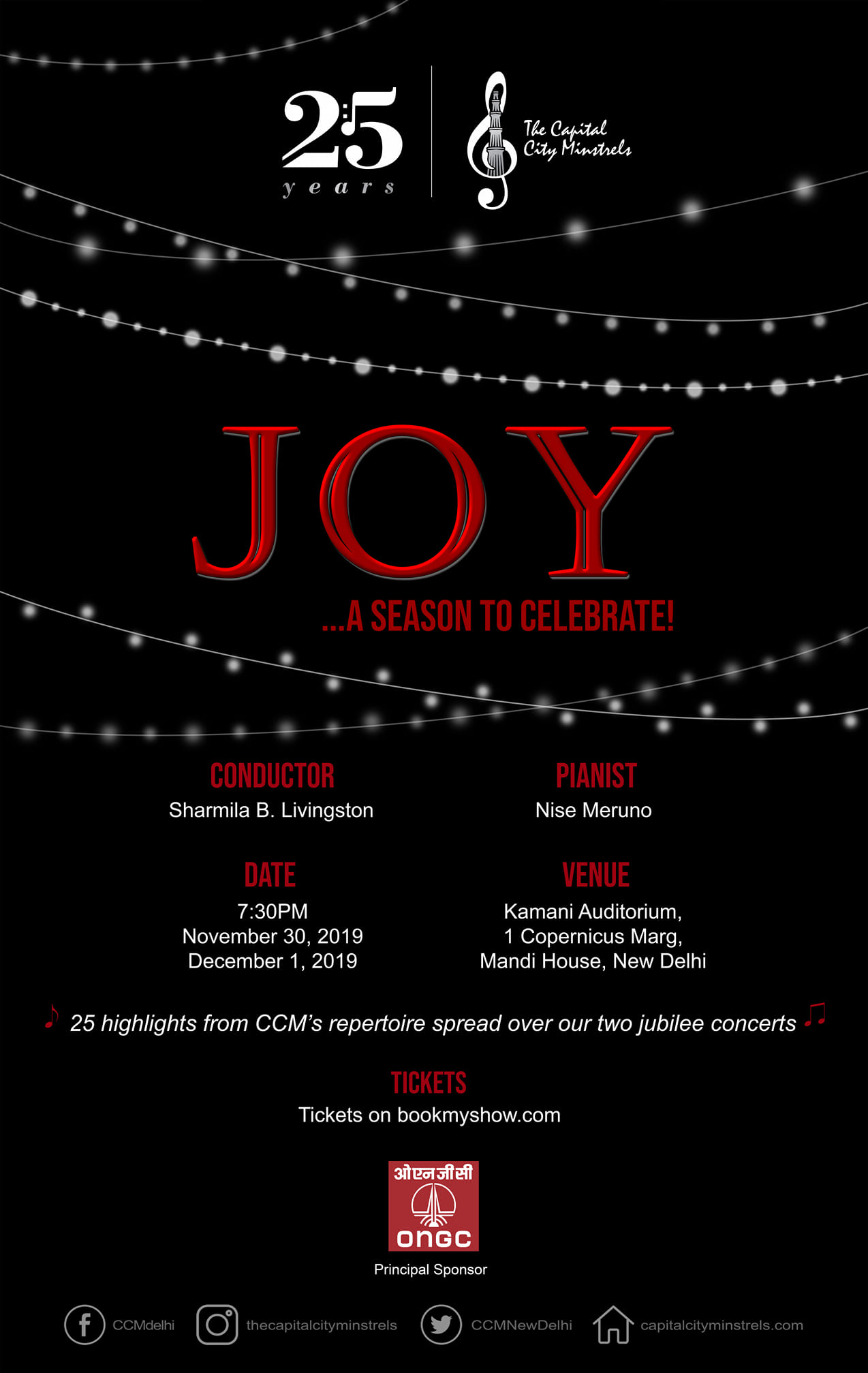CAPITAL CONDUCTORS
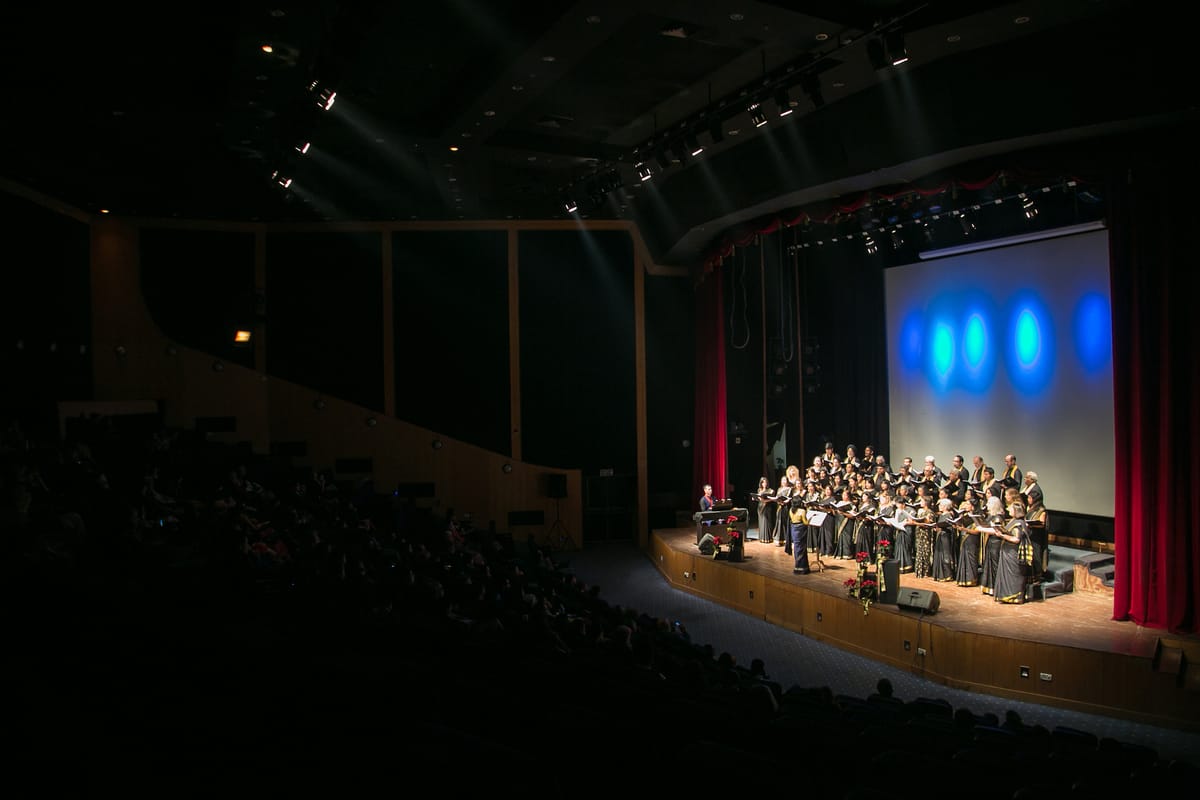
An early Christmas gift to New Delhi’s concert–goers comes in the form of a gala choral concert, by the city’s very own choir, the Capital City Minstrels, who are celebrating their silver jubilee this year. Joining the audience for the occasion will be some very special guests: CCM’s past conductors, who are coming in from around the world, a gesture that speaks volumes of the depth of their engagement with an ensemble that each, in their own way, nurtured into musical coming-of-age. When interviewed via email, their responses reveal the close ties they continue to cherish with the CCM, and their high regard for the dedication and joy with which CCM make music.
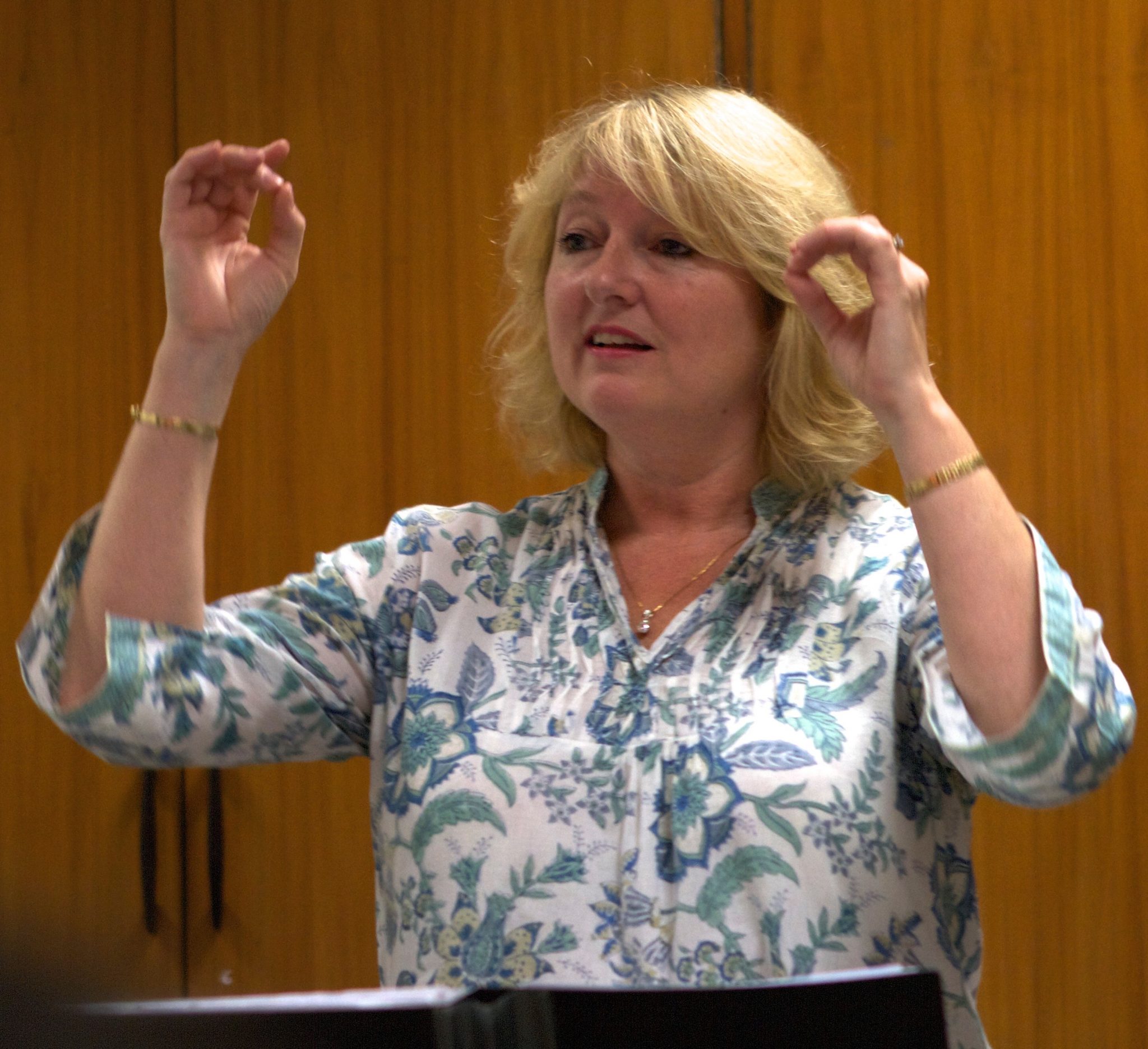
Conductor: Fiona Hedger-Gourlay
Fiona Hedger-Gourlay has studied music at the City of Leeds College of Music (Piano/Clarinet/Musicianship) and holds a B.A in Performing Arts (Music, Dance, Drama) from Middlesex University, London. She has worked in the UK and Europe as a performer (singer/actor) in musical theatre, children’s educational theatre, and as a singer and instrumentalist in various music ensembles from classical to pop.
Serenade Team: As conductor of the CCM, what led to your taking on this appointment?
Fiona Hedger-Gourlay: My husband (Tim) and I arrived as expats in New Delhi in March 2006 and wanted to join a local/expat drama group but couldn’t find anything suitable. We were fortunate to be introduced to Sharmila Livingston and she invited us to join CCM in August 2006.. Within 6 months of being in Delhi, I formed a choir of 24 women from 12 nationalities, called the “Delhi Divas”, and co-created a drama group “Delhi Footlights”. Both were very popular and successful. I also co-produced and directed the Broadway show: “The Magic of Broadway” in 2008. When Gabriella Boda-Rechner resigned as music director of CCM, I was asked by the CCM President and Chairperson to take over the post from August 2010.
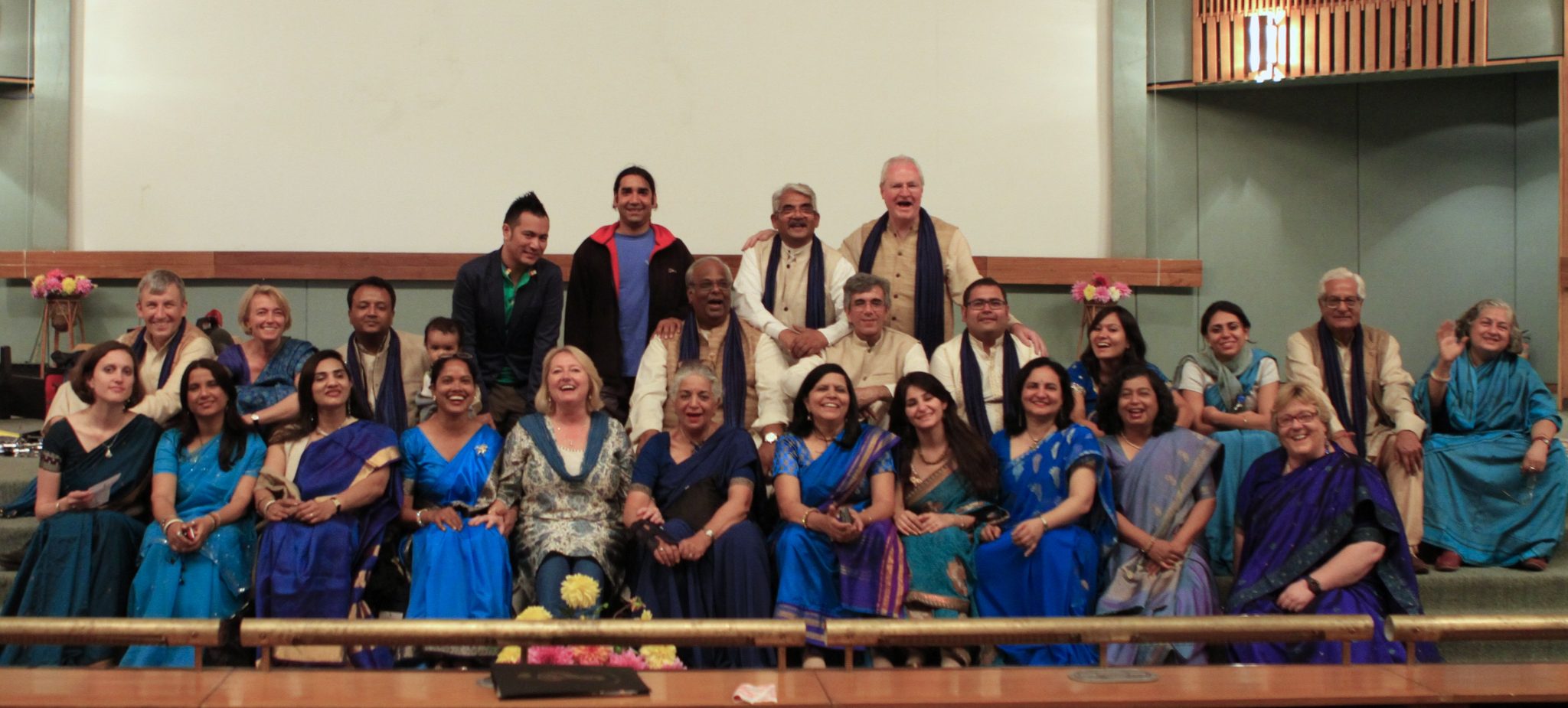
ST: What was the composition of the choir during your tenure?
FHG: If I remember correctly, the choir membership was around 40-50 people in August 2010, and increased to around 80 at the end of my tenure. Membership was from a cross section of society and nationalities, from 16 years to 70+ years. The majority of singers simply loved to sing, with no, or little previous choral experience but bags of enthusiasm and passion, with a small percentage of singers who were well trained. I introduced more contemporary music, and I think this attracted younger members.
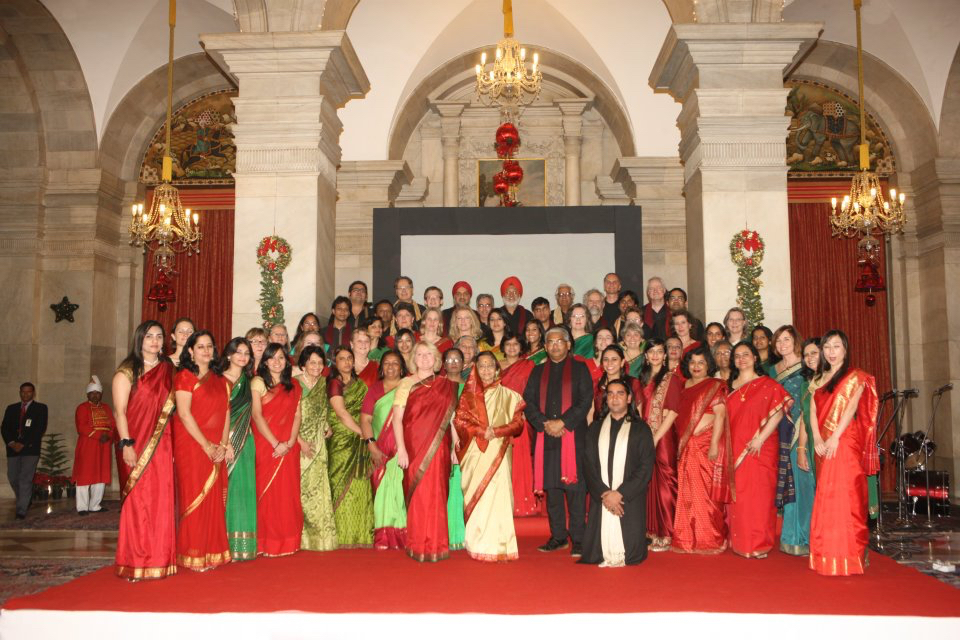
ST: What was the repertoire you featured at performances?
FHG: I introduced more contemporary music, classically songs from Karl Jenkins’ Requiem/The Armed Man/Songs of Sanctuary, from John Rutter (various) and Andrew Lloyd Weber (Requiem) and others. In addition, I introduced modern gospel arrangements, a variety of world music, music from stage, screen and pop and modern folk. As a musical theatre performer, it was always important to me that the choir represent accurately the emotional content of each song, and not just sing the correct notes!
We had a lot of fun, raising the roof, even in rehearsals, if that was the emotion required. I am a firm believer that being in a choir should be a joyful experience. Even if one is rehearsing more sombre music, there is the joy of connecting with one’s vulnerable and sensitive emotions, that often we don’t show in private.
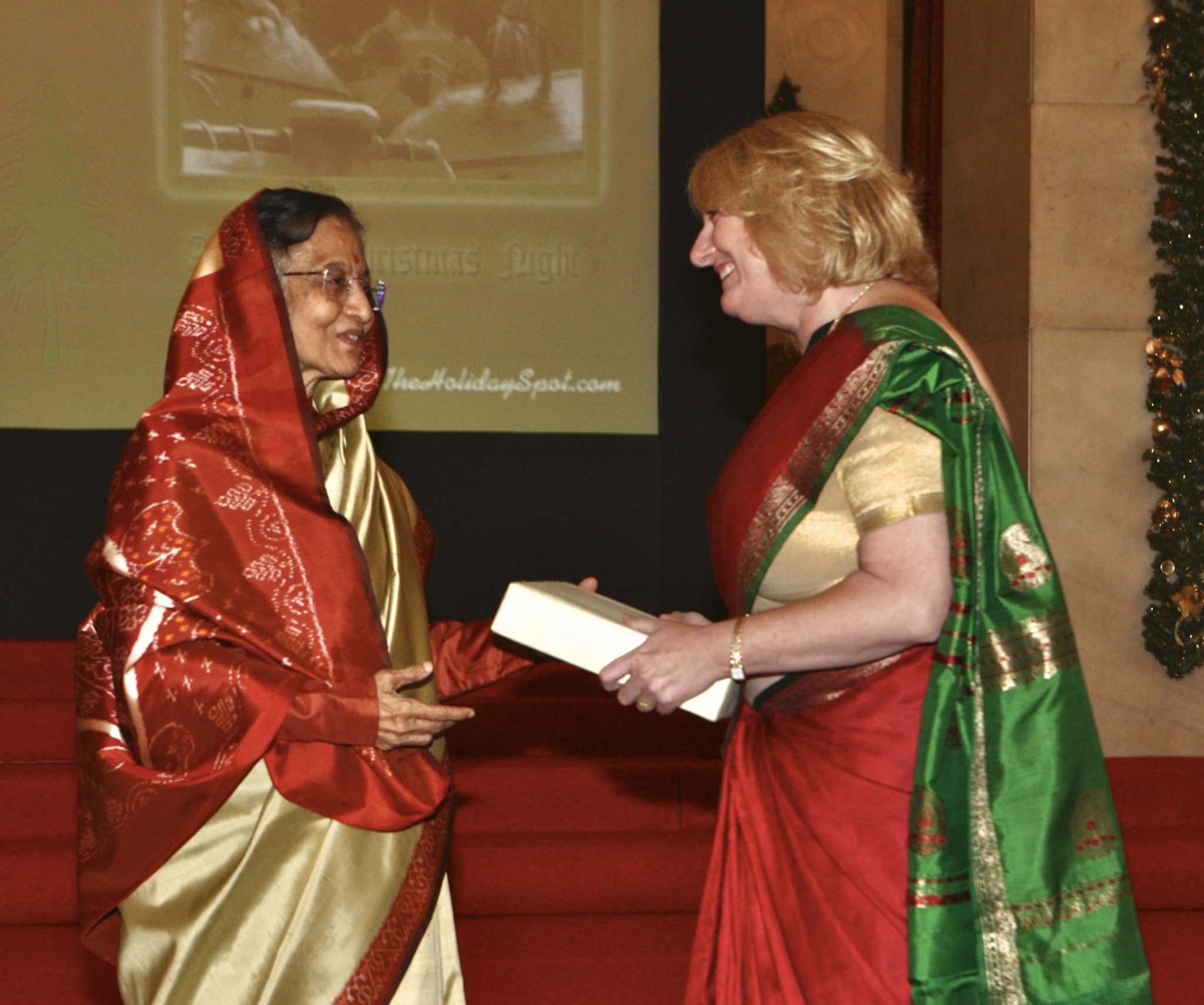
ST: What are some of your memorable moments with CCM?
FHG: The joy of working with such a wonderful and enthusiastic group of singers and performing to such loyal and appreciative audiences in New Delhi and Gurgaon, as well as other regions in India, Europe, and recently, their choir exchange visit to my current choir in Scotland. Other memorable moments were performing twice for the President of India at Rashtrapati Bhavan, and the choir tour of Kashmir and other regions. During my tenure with CCM as music director, I was thrilled to work with and establish the amazing Nise Meruno as the choir’s resident accompanist, after many years away. I also had the privilege of featuring in my concerts the excellent percussionist Suchet Malhotra and saxophonist Rie One, as well as the talented Jina Lee on piano.
ST: Your words of advice as a professional choral conductor for the CCM?
FHG: Carry on doing what you are doing. I see you grow and develop from year to year. Your passion and enthusiasm is contagious and encourages other to be creative. Your commitment to constantly improve your craft, without losing your joy, is inspiring.
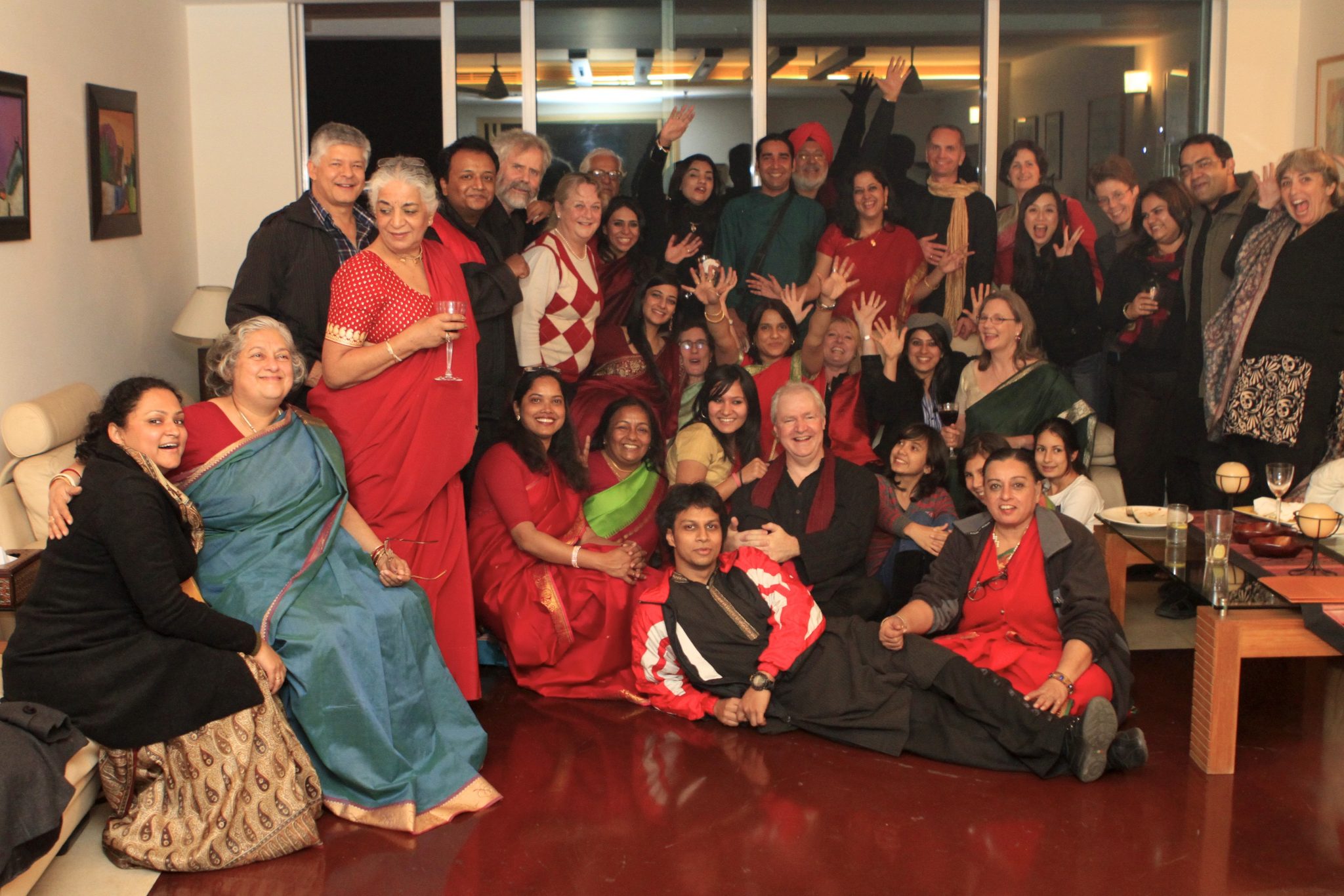
ST: Are you in touch with the members of your choir?
FHG: Of course, they are my family! Once a CCMer (in any capacity), always a CCMer! My husband and I left India in 2012 and our visit in November for CCM’s 25th anniversary will be our 6th return visit, and each year we see CCM friends in the UK, and as there are ex-CCMers all over the world, we are often found congregating in various countries whenever we can.

Conductor: Diane Pritchett
Serenade Team: Could you please share your musical background in terms of education and experience before you came to India?
Diane Pritchett: I have a PhD in political science, but had always been involved in music, choral and piano accompaniment, in my church leading the choir, teaching children singing, playing for services and teaching piano. I had intended to study music when I went to university but got side-tracked into international relations. After finishing my PhD and getting my three children to school age, I went back to school and got a degree in music education with an emphasis in choral conducting.
ST: As conductor of CCM, what led to your taking on this appointment?
DP: I was teaching music at the American Embassy School in Delhi. I met Doris Cantor Visscher and Lola Mathai who were singing with a community choir at the school that I conducted. CCM was in need of a conductor. As I as very busy with teaching, raising children, leading the school community choir and church music, I agreed to take it on temporarily until they could find someone else. I worked with CCM for one season.
ST: What was the composition of the choir during your tenure?
DP: It was quite similar to the choir now even with some of the same participants.
ST: What was the repertoire you featured at performances?
DP: I did a peace concert and a Christmas concert. To be respectful to the traditions of the choir, I tried to mix repertoire they already did with new music.
ST: What were some memorable moments with CCM?
DP: We sang a Christmas concert at the cathedral in Delhi right around Christmas time. It was a beautiful setting and a rich experience for me to part of it.
ST: What do you think is the future for choirs like the CCM?
DP: Choral singing is declining in the Western world as people move towards consuming music rather than making music. I’m glad there are people in India, just as there are in the Europe and the US, working to preserve the tradition.
ST: Your words of advice as a professional choral conductor for the CCM?
DP: As a professional choral conductor, I think it is important for there to be room for choirs of professional, seriously trained singers along with the choirs of amateurs adhere to the origin of the word “amateur” by loving what they do even if they aren’t trained and professional. It is tempting for choirs to try to raise their standards by pushing themselves into a less inclusive community. I advise community choirs to be open to all. A good choral conductor and teacher can make good music with even the most inexperienced of singers as long as the singers are willing to adhere to the practice standards. By being inclusive, being willing to welcome and train inexperienced singers, a choir can grow and preserve the wonderful art of choral singing.
ST: Are you in touch with the members of your choir?
DP: Yes I am both through Facebook, Gmail and contact. The original two women who invited me to the choir, Doris and Lola, have come to visit me in my home in the US. I have met up with the wonderful pianist Nise Meruno in England when I was living in England and he was visiting. When I return to India I always meet up with one or two friends from the choir. I look forward to reuniting with others.
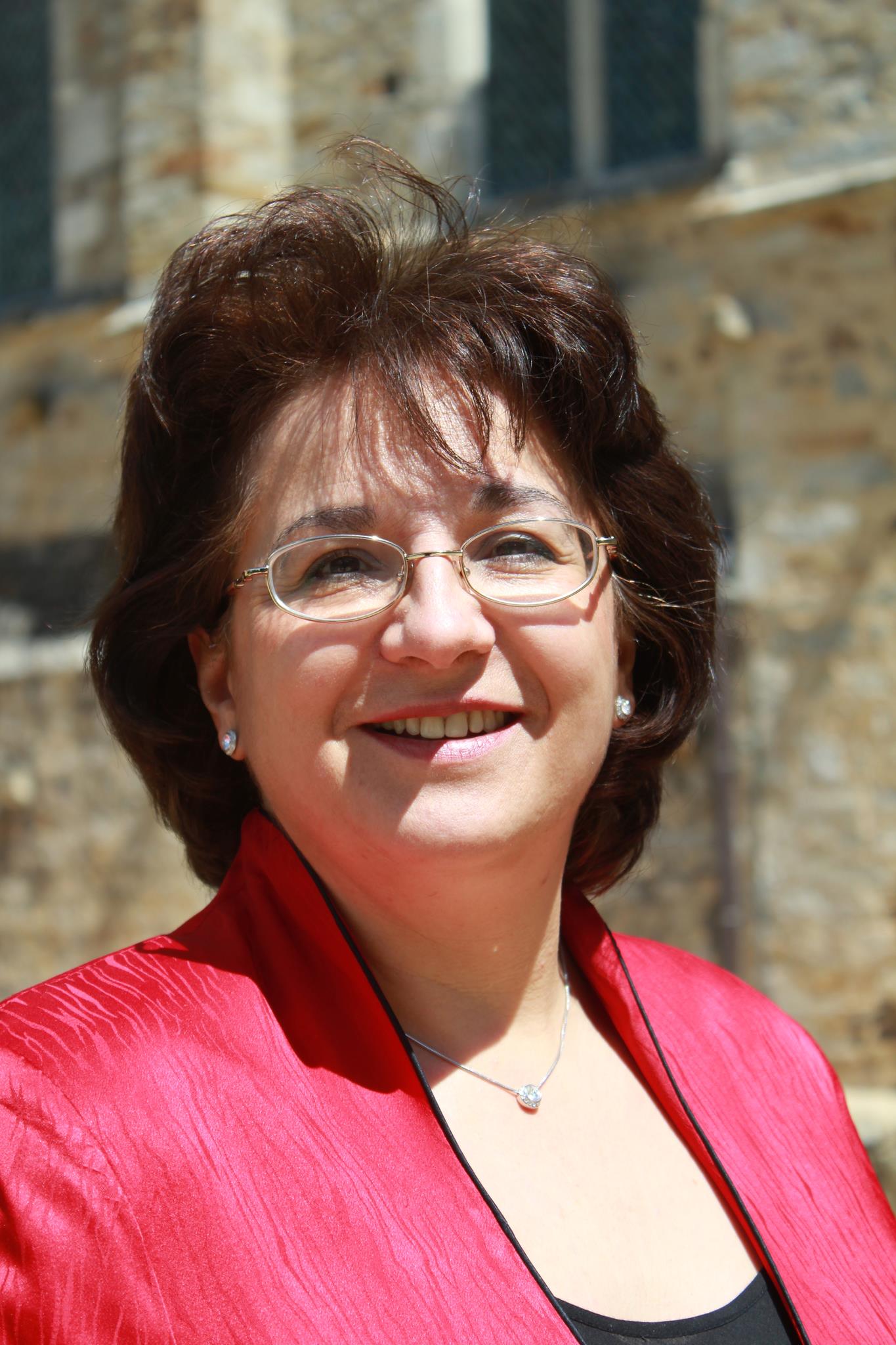
Conductor: Gabriella Boda-Rechner
Born in Budapest, Gabriella Boda-Rechner is one of the most sought after Hungarian choirmasters, and has established herself as one of the leading Kodaly Method specialists on the international scene.After graduating from the Debrecen University of Music, Hungary,she moved to Morocco in 1979, where she lived for almost 20 years. During this period, she founded the Chanterie de Rabat, the first ever children’s choir in the country as well as the Vox Humana Choir and trained most of the elementary and middle school music teachers of the country. In 1999, the Government of France bestowed on her the prestigious award of Chevalier des Arts et Lettres (Knight of the Order of Arts and Letters) in recognition of her contribution to spreading French musical culture in Morocco. In 1998, upon moving to Paris, she was appointed as assistant director of the Paris Opera Children’s Choir as a result of which she collaborated with the leading orchestral conductors of the international scene. She works closely with the Mouvement A Cœur Joie, an international choir organization, holding workshops for adults and children singers. In 2002, she moved to Beijing, China where she was a visiting professor at the China Music Conservatory. She performed in venues such as the Forbidden City Concert Hall and the Beijing Concert Hall. During her 4-year stay in China, she led workshops for choir conductors in different cities. The China Music Conservatory conferred on her the title of Honorary Professor. In 2006, she moved to New Delhi, where she worked with the Neemrana Music Foundation. She was also the chief conductor of the Mozart Children Choir and the Delhi Chamber Choir. The Government of Hungary honored her with the prestigious Pro Cultura Hungarica award in recognition of her devotion, energy, enthusiasm and knowledge put in the service of Hungarian music. Since 2010, she is the artistic director of the Sarthe (72) Vocal Academy based in Le Mans. She also directs a musical program for underprivileged children from suburban Paris.
Serenade Team: As conductor of the CCM, what led to your taking on this appointment?
Gabriella Boda-Rechner: When in September 2006, my husband was appointed head of the Alliances Françaises network in India, of course, I followed him! In Delhi, I first visited the Alliance Française and then the Hungarian Institute. During my visit, the director told me that a choir was rehearsing. It was the CCM! Naturally, I started to play the piano to accompany the rehearsal. The choir was then conducted by Sharmila Livingstone. I became the CCM’s accompanist until the concert in December 2006. Sharmila wishing to turn to other activities, I took over the direction of the choir in January 2007.
ST: What was the composition of the choir during your tenure?
GBR: At that time, the CCM, with at least sixty members, was composed of Indians from all geographical and social backgrounds, but also very many foreigners from all over the world.
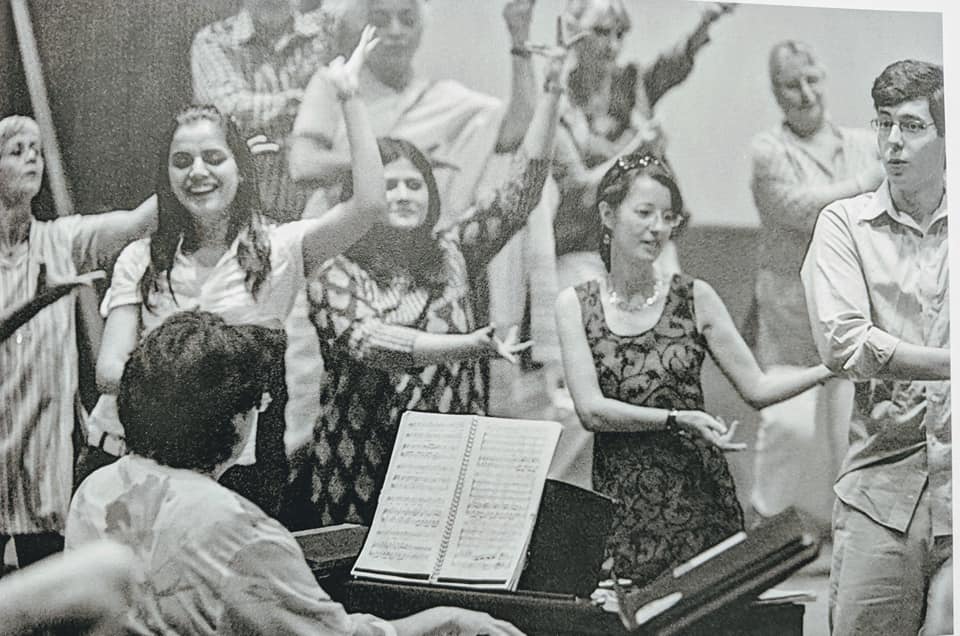
ST: What was the repertoire you featured at performances?
GBR: Our repertoire was extremely varied: songs from folklore all over the world, ethnic masses, excerpts from operas, oratorios, various pieces of classical music, and of course pieces from the Hungarian repertoire since we rehearsed every Wednesday at the Hungarian Institute! We also sang several Indian songs, harmonized for choir by Sharmila Livingstone and Usha Srivasta.
ST: What were some memorable moments with CCM?
GBR: We had many memorable and happy moments with the CCM. In addition to the regular concerts in Delhi or Gurgaon, we sang in front of students at Lawrence School in Sanawar and The Doon School in Dehradun. We organized an extremely successful tour in Hungary, Germany and France. I should add that the celebrations organized by the CCM after the concerts remained memorable moments, as we enjoyed ourselves so much with joy, good humour and the shared pleasure of music.
ST: What do you think is the future for choirs like the CCM?
GBR: In India, choral singing is still in its infancy. A whole section of this wonderful leisure activity remains to be built in India. Choral singing allows people to come together; few other hobbies allow so many participants to share a great moment of pleasure. In India, it is necessary to continue and persevere towards this discovery of other cultures, other civilizations that choral singing brings. It is a leisure activity accessible to all, children and adults of all ages. It is crucial to train many choral conductors so that choral singing can benefit as many people as possible in India. I know that in several cities in India, choral singing is developing thanks to motivated people.
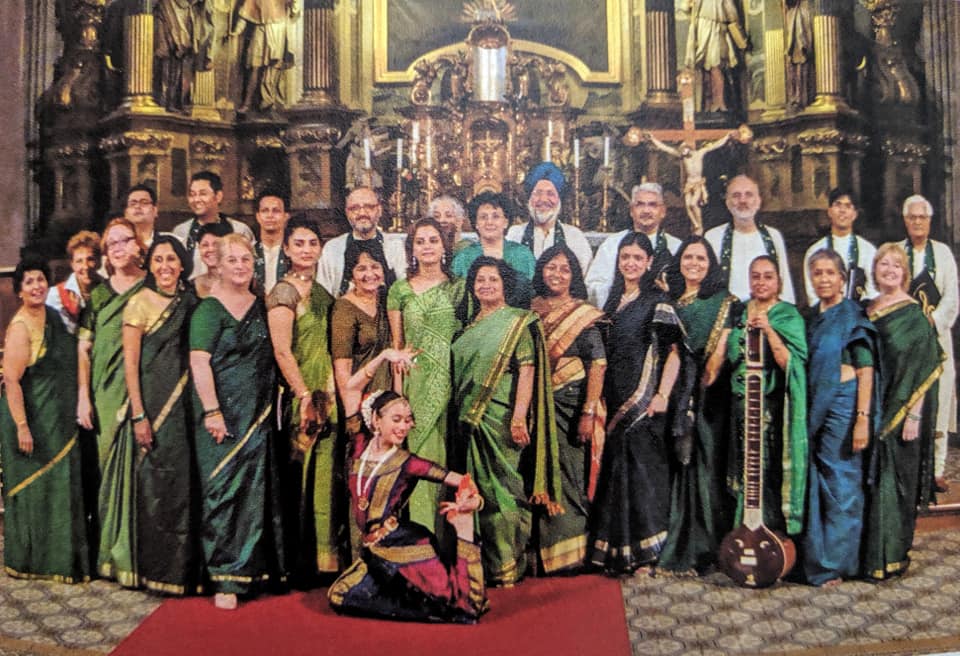
ST: Your words of advice as a professional choral conductor for the CCM?
GBR: A choir is polyphonic joy: singing or hearing, a clever combination that intelligence leads and that the heart nourishes. A choir is a time of sharing, group spirit, friendship, trust in others, which is different. Through choral singing, we have the chance to experience that the “different” is essential to harmony (the four voices – alto, tenor, soprano, bass – listen to each other and unite). Singing in a choir is also an individual challenge: to improve, to develop your vocal technique, your ability to read notes or perhaps to start from scratch, without a solfegic reference point, without a cultural reference point (classical music), polyphonic… so this is the great adventure and everything is to be won! It is in this spirit of sharing, trust and musical passion that we have lived with the CCM.
ST: Are you in touch with the members of your choir?
GBR: The emotional and human musical experience shared within the CCM cannot be erased by distance. Also, yes, I have many, frequent and regular contacts with many of the CCM’s choristers. We are always very happy to meet again and I know that this twenty-fifth anniversary of the CCM that we will share and celebrate together will be another memorable moment in our common life!
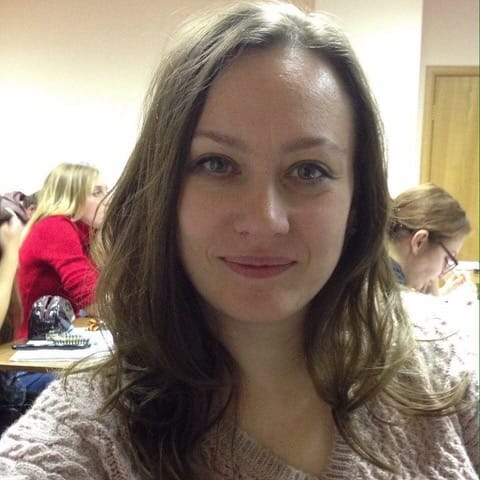
Conductor: Nadya Balyan
Serenade Team: Could you please share your musical background in terms of education and experience before you came to India?
Nadya Balyan: I graduated music school along with conventional secondary education. Followed by receiving a Bachelor’s degree in Piano and Choir conduction from ‘Tula College of Music’. I received a Master’s degree in Music Theory from ‘Moscow Arts and Cultural University’. Before coming to India in 2007, I worked in a music school – “Tchaikovsky”, in the city of Tula, as a Music teacher for 5 years. I also conducted several choirs, amateur and professional, of different age groups which participated in numerous festivals and competitions.
ST: As conductor of the CCM, what led to your taking on this appointment?
NB: The assignment was offered to me by then-conductor Gabriella and by Usha Shrivastava, to which I happily agreed, as I was very keen to experience working with one of the most well-known and big Indian choirs in Delhi.
ST: What was the composition of the choir during your tenure?
NB: Since it was a while back, I guess there were around 50 people in the choir. It was a mixed choir. The majority of singers were Indians, but at the same time there were people from Germany, England and many other European countries.
ST: The repertoire you featured at performances?
NB: We were more focused on classical music. For the first time in CCM repertoire, we added songs by Rachmaninoff. We also performed Schubert’s Mass in G major.
ST: Some memorable moments with CCM?
NB: The most memorable performance was performing for the President of India in The Rashtrapati Bhavan as part of the Christmas concert. Not to forget the most enjoyable and unforgettable moments, which were the breaks between the practice sessions, where our discussions were enjoyed along with very tasty food cooked by the members of the CCM choirs.
ST: What do you think is the future for choirs like the CCM?
NB: I think it’s very bright, as the demand for Western classical music is growing day by day. Many young Indians are getting more involved and interested in Western classical music, choral music, of course, being a part of it. There are lot of new opportunities awaiting such choirs in India.
ST: Your words of advice as a professional choral conductor for the CCM?
NB: I can only suggest that the CCM may include more classical music in their repertoire. I believe, that they have all the resources and possibilities to do well.
ST: Are you in touch with the members of your choir?
NB: Yes, I am in touch with Usha Shrivastava, who has always been very helpful and supportive. Geeta Bhatia had also sung in my choir, “Delhi Chamber Choir” for a few years. There are many more members, whom I still remember and have a warm place in my heart for.
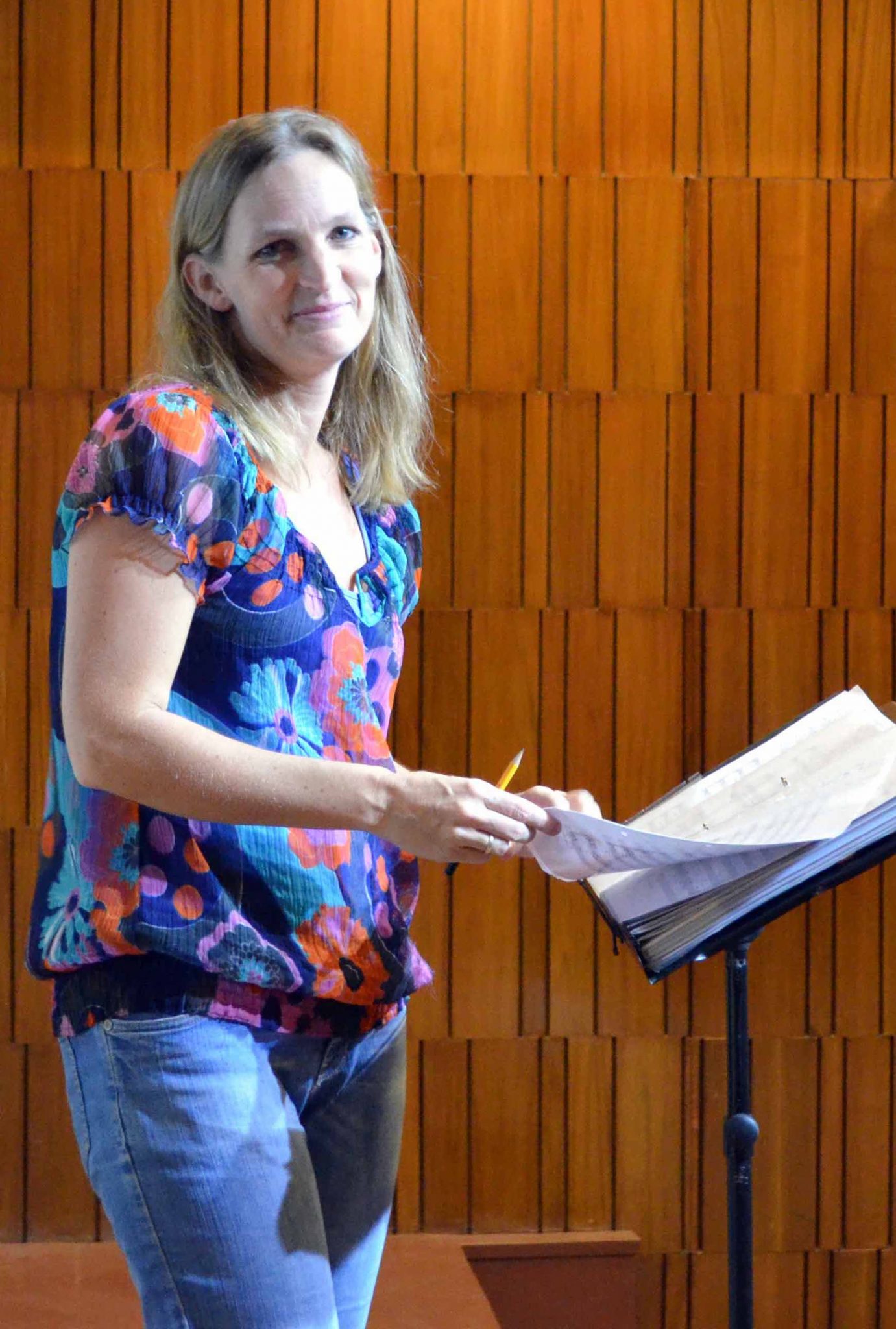
Conductor: Carolin Remy
Serenade Team: Could you please share your musical background in terms of education and experience before you came to India?
Carolin Remy: I was lucky to be born into a very musical family and was exposed to music and musical instruments from a very young age As far back as I can remember I was singing and playing the piano. I was singing in choirs from the age of 16 and I never stopped. Of course, all this was supported by serious music studies as well. I went to the University in Eichstätt, Germany, to pursue dual qualifications to graduate both as a primary school teacher as well as a music teacher. This opened up many interesting opportunities and my undying passion for music and love for children gradually attracted me to conduct several childrens’ choirs in Germany. In parallel, I pursued specialized training to become a certified choir director for non-professional choirs. All these acted as foundation for my work in India – where I founded the Children Choir in the German School and took over the baton for the Mozart Children’s Choir for some years even before my association with The Capital City Minstrels.
ST: What led to your taking on this appointment?
CR: I reached Delhi in 2004 and one of the very first things I did was to search for a choir to sing with. This led me to join The Capital City Minstrels (CCM) soon after their Christmas Concert 2004 when Diane Pritchett was Conductor. After singing with CCM for a couple of years, I stopped singing since my children were born in 2007 and 2008 and I had a lot to figure out. Listening to CCM’s Christmas Concert 2011 conducted by Fiona Hedger-Gourlay, I felt the urge and urgency to sing with CCM again. However, destiny had other plans. Fiona was leaving India for good and CCM were on the lookout for the next Conductor. When a German friend suggested that I seriously consider it, my first reaction was, “Are you insane? Never!“ Of course I had conducted many choirs but getting back from maternity break to conduct a large choir like CCM felt challenging. Even so, I couldn’t get it out of my mind and, with the support of many friends and CCMers, I decided to take the plunge and become CCM’s next Conductor. I believe it is one of the best decisions that I have taken in my life!
ST: What was the composition of the choir during your tenure?
CR: CCM is special for me. The choir sings the ‘Hallelujah Chorus’ as enthusiastically as it sings a rendition of ‘Raghupati Raghav’ or ‘Waka Waka’. It reminds me that music unites, cutting across age, culture and religion. CCMers have just one reason to exist – to love music! Under my baton we attracted lots of younger singers, because of the repertoire we did. Every season, I was always surprised by how many people queued up for auditions – youngsters with fresh voices. Of course, expat and tenured singers (many of them Germans) walked in to audition too.
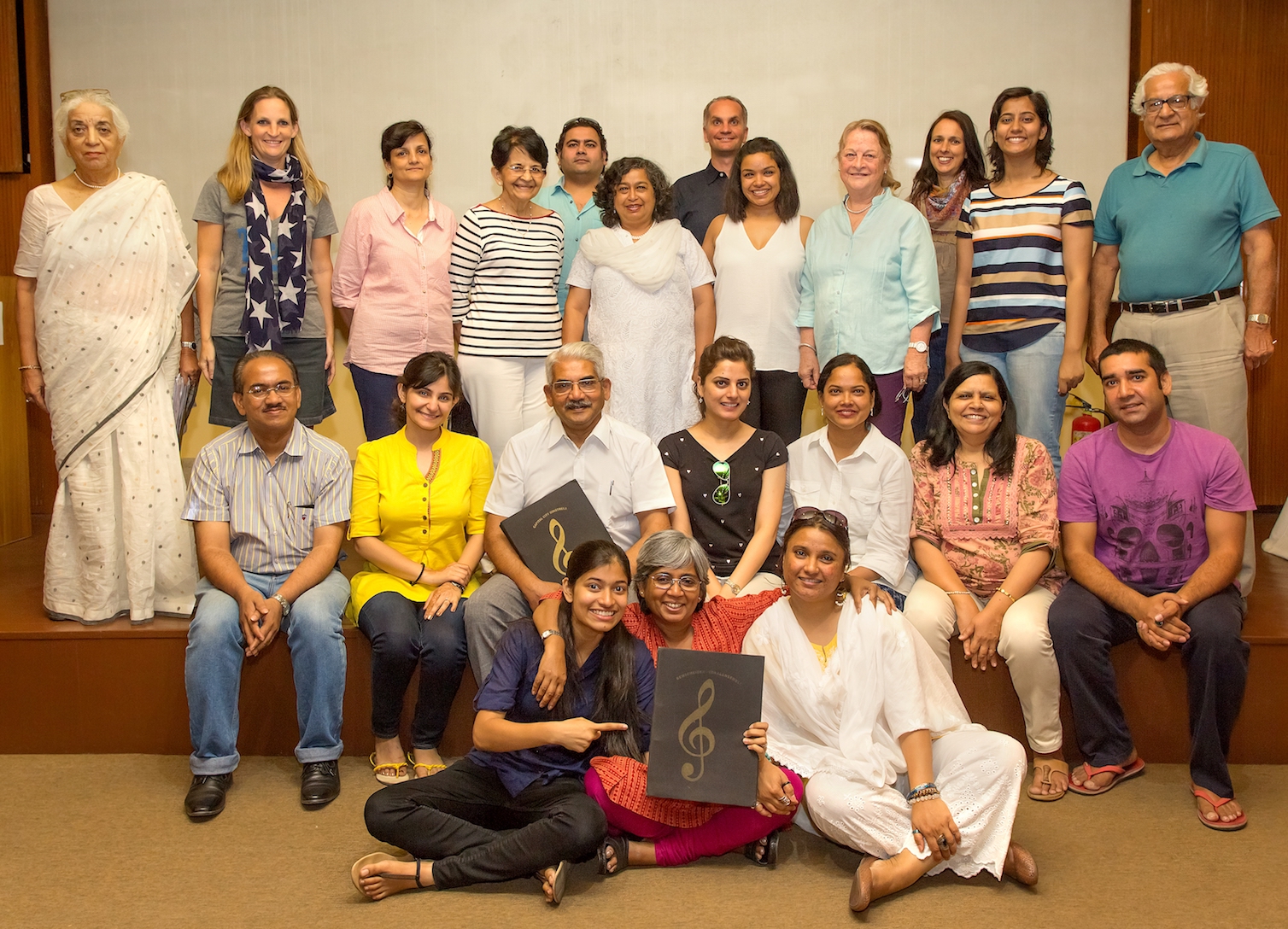
ST: What was the repertoire you featured at performances?
CR: Trying to satisfy singers and the audience with just the right mix of genres and difficulty levels in a repertoire was very difficult. And don’t forget, that I needed to be excited about the repertoire too. I have tried to showcase the variety of different music genres over the five and a half years that I conducted CCM. We performed Western classical music, sacred and gospel music (Gospel Mass by Robert Ray), folk songs from all over the world and even rock and pop. The arrangements varied from a cappella to songs accompanied by piano and percussion to those where I used more string instruments, recorder, sax and even electric guitar. I added some choreography and body percussion when I felt that it would add something to the music. I discovered that CCM could sing folk songs and pop songs and I launched into Jai Ho, Waka Waka, Baba Yetu and Africa, and even today many people I meet remember these renditions fondly.
ST: Some memorable moments with CCM?
CR: There are so many! But the high point surely was the amazing Europe trip in 2015. 35 choristers being on tour together for 2 weeks, travelling a few thousand kilometres in a large tour bus, performing 8 concerts in Germany, Hungary and Switzerland – unbelievable! The most memorable concert of that tour was performed in Geretsried; Bavaria in my home town. I could feel how every CCMer tried extra hard to make that concert perfect and thereby show me their love and commitment. They gave everything! It was one of those “goose bumps moments“ of life. I couldn’t hold back my tears and the accompanying musicians (Nise and Suchet) and many singers, had wet eyes.
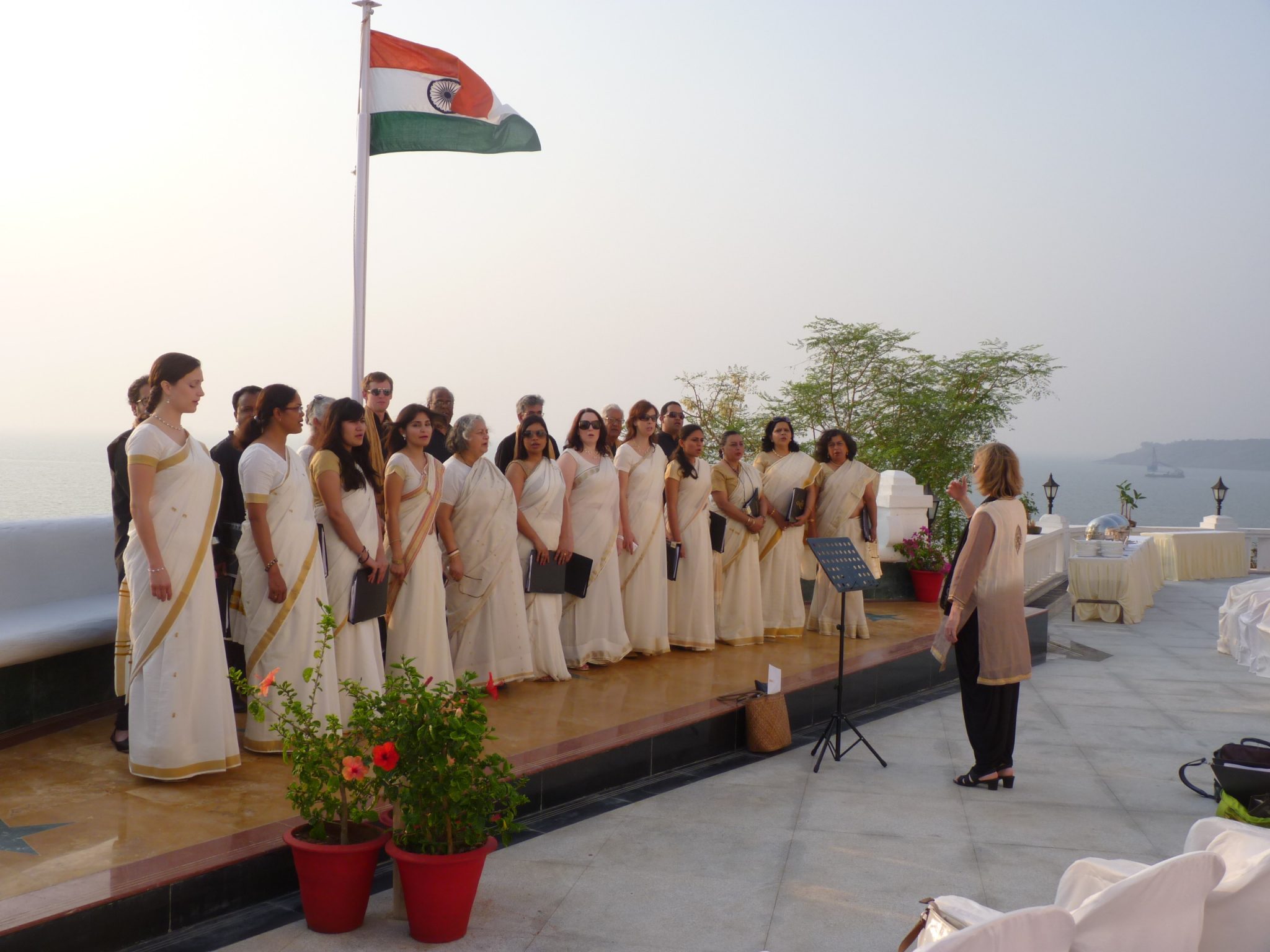
ST: What do you think is the future for choirs like the CCM?
CR: Western style choral singing is not an Indian tradition and in a country of 1.3 billion people, very few sing in choirs. That is changing though and singing in choirs is becoming more popular especially amongst youth. We see CCM growing and its concerts sold out. There is room for more choirs in India and maybe it is time for CCM to establish a youth choir or a childrens‘ choir Of course, there should also be enough programs for interested individuals to learn conducting in India to be able to help popularise choral music. Our chat group of current and previous members is called: Forever CCM! Perhaps that can be the name of the program!
ST: Your words of advice as a professional choral conductor for the CCM?
CR: During our Europe trip, we sang in concert with a professional choir of Bad Tölz, who are reputed in that region. After the concert I spoke to someone in the audience, mentioning that the German choir was excellent. She replied saying, “Yes, maybe they are. But when your choir sang, I started crying.“ So I urge CCM to sing and touch peoples‘ hearts no matter what genre of music they sing. That is CCM’s mission!
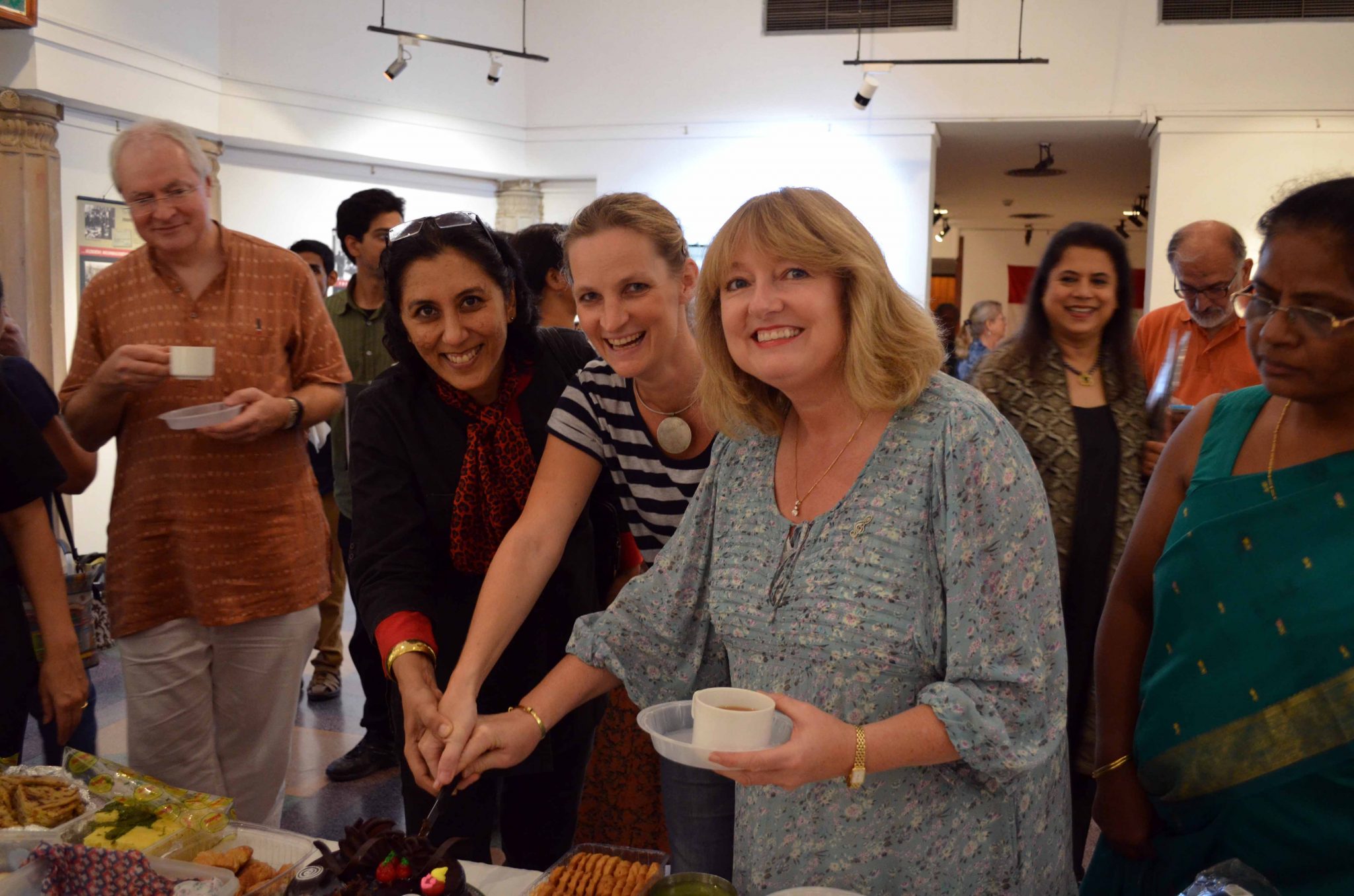
ST: Are you in touch with the members of your choir?
CR: When I speak of my 12 long years in Delhi, people ask if I made friends in India. I tell them that it was not that easy since most of our our social life was centred around people from the German community. But CCM broke this practice and made it easy for me to strike up friendships – solid friendships that overcome distance and time. It is like an extended family. We welcomed some CCMers into our homes in Bavaria with some joining the annual Bavarian choir week. Thanks to the digital world, I am in contact with lots of CCMers spread around the world.
